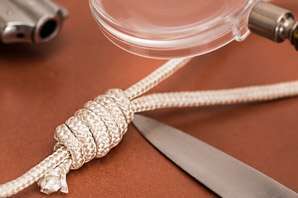
If you have interest in fighting crime, then becoming a forensic investigator will be exciting.
This post will guide you to getting into the career, but first know that the training that qualifies you to become a forensic investigator is called forensic science.
Who is a Forensic Investigator? (Career Summary)
Forensic investigators are basically trained personnel that aid in criminal investigation by gathering and looking at evidence from crime scene to enable law enforcement officers and the justice system determine who is guilty.
These investigators go by many names according to the environment or agency they find themselves; from being referred to as crime scene analysts, to forensic technician, or even the popularly called crime scene investigators.
They usually are made up of police officers, and many can even be seen attached to the police station on a full time basis, although recently, civilians are being trained in, and given the opportunity to serve a such experts, with a scientific inclination, rather than law enforcement.
To become a Forensic Investigator, you need to first:
- learn all you can about the job
- Prepare to meet the full requirements of the job
- Apply for the job after meeting the requirements
- The final stage is to train and continue to train. The job requires an up to date skill at every level, and so training is very essential
Educational Requirements for Becoming a Forensic Investigator
Academic training: The forensic investigator career begins with an Associate degree from a technical school, or a Bachelors degree from a college approved by the criminal justice department of the state where the school is situated.
You will be expected to take most of your courses in forensics and crime scene investigations, and at the end of the program, you will be awarded a degree in forensic science and crime scene investigations.
Courses: Undergraduates are to anticipate about 36 to 40 hours of general studies courses which may include language classes, math, and other courses drawn from the social sciences, humanities and also writing.
The natural sciences are not left out, as core sciences like physics, organic chemistry, statistics, and some general courses can be added.
Educational Institutions to get Forensic Investigator Training
Nowadays, a variety of institutions offer courses in forensic sciences ranging from Bachelor’s programs to masters degrees, and even doctorates.
The justice department and forensic bodies in the country the school operates in grants accreditation to study such courses, although the most common to our environment are institutions from India, and the United States; places like Argosy University Arizona (Phoenix AZ) and Arkansas State University, which offer a variety of programs in Forensic Science, and Crime Investigations.
In-Service Training: After completing your degree program, you will need to further your training with the agency you work with.
Most law enforcement agencies have established training program for new crime scene investigators to help them learn on the job under the supervision of senior investigators.
The training may take between six months and two years, and will cover areas such as DNA and firearms training.
After the in-house training, you will be required to take certain tests and examinations before you will be permitted to work independently, and be able to stay up to date through continuous training.
Forensic Investigator Certification
Most states and local law enforcement agencies usually require newly hired forensic or crime scene investigators to be certified or licensed, or both within 18 months of their employment. This is to ensure that the forensic investigators in their employment are of high expertise.
You can obtain certification from states which have their own certification programs. Such program emphasizes the state’s standards, including minimum training requirements and experience.
You can also become certified by taking certification programs by the International Crime Scene Investigators Association (ICSIA), International Association for Identification (IAI), and The American College of Forensic Examiners Institute (ACFEI) .
These bodies have different requirement for accepting applicants for their certification exams, so, you can visit their websites above to get details of what they require.
Areas of Specialization in Forensic Science
Forensic science graduates may specialize in area related to DNA, which focuses on substance testing, matching blood samples, and connecting them.
Firearms and tool marks – This concerns the matching of spent bullets with firearms that produced them; the ability to mark out microscopic fibers of physical evidence like hair, pollen, and food, which may aid investigations.
Branches may also be subdivided to accommodate skills in investigation, art authentication, archeological forensics, forensic astronomy, forensic engineering, forensic geology, etc. and trainings required in areas such as;
- Alternate light source training
- Footwear and tire tread
- Forensic odontology
- Clandestine laboratory training
- Arson investigations
- Blood pattern analysis
- Latent print comparism
- Crime scene documentation
- Death investigation
- Evidence photograph
Skills to Succeed as Forensic Investigator
Various skills and qualities may stand you out as a successful crime scene investigator or forensic investigator on the field. They include:
- A good understanding of the requirements of the job is most important. Other qualities may include;
- Developing skills in scientific writing, analytical thinking, attention to details, problem-solving, public speaking, and computer or electronic application.
- Ability to be professional in conduct, irrespective of how horrifying the crime scene may be, making sure certain clues are not missed, following due procedures, and applying excellent communication skills, are required quality.
Career opportunities: Career opportunities exist in forensic investigation. In fact, the bureau for labor in the United States predicts that from 2010 to 2020, jobs in forensic investigation will grow by 19 percent, which is above the standard requirement of 14 percent rate expected of all professions.
Expected salaries: According to Crime Scene Investigator, http://www.crimesceneinvestigatoredu.org/in the United States, salary expectations may range from $55,000 to $115,000 depending on experience and city location.












